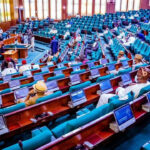
As always, they almost all think that with diktat on nearly everything, the people would be controlled sheepishly with the law. Therefore, I would not at all be surprised if human rights activists and some lawyers in the country are themselves quite irritated by the kind of laws the House of Representatives are proposing in recent times.
The other day, the House of Representatives members sought all legal frameworks through a bill to outlaw strikes in the health sector. The bill is known as, An Act to amend the Trade disputes Act, cap T8, laws of the federation of Nigeria, 2004. This bill when passed to the law will prohibit medical practitioners in the employment of federal, state, and local governments in the essential services sectors from embarking on strike. Thereby making it unlawful to undertake any gathering and by implication any public discussion about health workers welfare that would disturb public peace.
Indeed, the concerns about the health sector are many and varied. And as if that is not enough burden to bear, health workers are now to be chastised for their apparent decision to embark on strike over government failure in the sector. There is no objection to the fact that, the outcome of some laws proposed by the House of Representatives members is devoid of controversy. It therefore paints a picture of their inability to pursue a solid, coherent and consistent people-oriented policy. Somehow, the proposed bill encourages health workers to give up Nigeria and emigrate to law-abiding climes and greener pastures. In its rush to enact a law banning strikes in the health sector, the House of Representatives members became blind to the fact that, strike action is the last option after several failed talks and ultimatum offered by the workers’ union. However, not all new or proposed laws should worry Labour unions or Nigerians in general. But to use the law to protect the government’s insensitiveness and infringe the rights of workers to speak out through protest is one step too far.
Indeed, well-meaning Nigerians cannot fail to be mystified by the way in which the House of Representatives members chose to violate the principles of freedom of association as enshrined in the Constitution of the International Labour Organisation (ILO): an international body, to which Nigeria belongs as a member that recognises the rights of workers to protest.
In every shade or colour, the proposed law against a strike in the health sector appears to support poor leadership and governments’ continued foot-dragging to address the healthcare challenges in the country. Ask any government official what actually goes on in their mind during workers’ strike and you will be met with a blank stare. That is why they are so anxious proposing a frigid sanction through the back door to frustrate health workers from demanding their rights. The point must be noted that in a genuine democracy, the government should not be seen as a complex system. Such allows unscrupulous politicians armed with their own motives and fears, to propose a law in disguise under the pretense of ‘for the good of the nation’. With the prayers behind the proposed law, the House of Representatives members are trying to silence what keeps the government on its toes. And especially that, which constantly allows the people to know the level of governments’ negligence and rot in the health sector. Of course, it is on record that the only language government past or present listen to in Nigeria is strike. Strike is one of many voices than dialogue that compels the government to do what otherwise it had declared unworkable.
The proposed law by all intent is ingeniously awful and designed to encourage poor leadership. Therefore, it is unpopular and regarded as not only a bad omen but dead on arrival in the eyes of the public court. To be candid, one principle of good lawmaking is that rules should be both simple and enforceable. It should be noted that it is not merely the health workers that the law targets. They threaten, in my view, our liberties as citizens. Hence, a clear majority of Nigerians do not want the health sector freedom of expression to be arm-twisted by the law. The problems facing the country today is not about health workers going on strike. It is because the government thrives on corruption and nepotism. Every Nigerian is a witness to corruption’s destructive tendencies in all sectors of the economy. However, if the government chooses to follow the right path, Nigeria can be revived in the next decade. It is a pity that the sad situation we now found ourselves in reveals our paying the prize of the extraordinary lack of vision, incompetence, nepotism, insensitiveness among others as the current features of government. Therefore, the President Muhammadu Buhari government would not go down as a great administration if the Aso Rock decision-makers continue to disappear down a series of rabbit holes. Particularly, as it exerts so much energy in pursuit of gimmicky ideas that would create needless enemies and exasperate tension in the polity. Instead of focusing on the symptoms as well as embracing policies that will help improve the health sector and grow the economy, the National Assembly opt for draconian and repressive option. One wonders if we are truly in a democracy with the kind of arbitrary decisions and indiscriminate disregard of court orders. In any case, the House of Representatives’ members is not so smart with their unpopular bill. Whatever route they intend to make the bill become law, the Nigeria Labour Congress (NLC) is waiting at the public square to name and shame.













